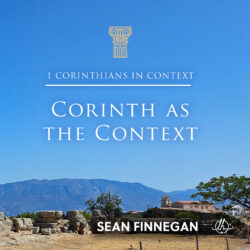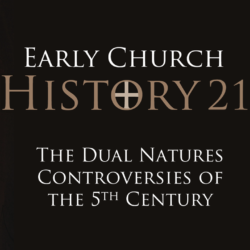Last week John Truitt began discussing the theological framework of dispensationalism, especially the “mid-Acts dispensationalism” taught by the Way International. He pointed out some flaws that got his attention and made him explore the issue more deeply. In the course of his research, Truitt discovered another way of approaching scripture known as covenantalism. In this episode he explains his covenantal approach with special emphasis on the new covenant, including the responsibilities and benefits of this new way of relating to God.
—— Links ——
- Get in contact with John Truitt through the Allegiance to the King site or by joining his Facebook Group
-
To join one of Allegiance to the King’s weekly virtual fellowship meetings, visit here or email contactallegiancetotheking@gmail.com
-
If you would like to attend the 20s and 30s Christian Conference in Paducah, KY (June 12-14), check out the Facebook Page – 20’s & 30’s Christian Conference
- Check out previous podcast episodes with Truitt including Virtual Fellowship for Isolated Believers and Apologetics Conference: 6 Evangelism, Jesus’ Way
- See all interviews with Truitt
- Intro music: Good Vibes by MBB Attribution-ShareAlike 3.0 Unported (CC BY-SA 3.0) Free Download / Stream: Music promoted by Audio Library








If Jesus had wanted to say “THAT [i.e., Future] generation” instead of what’s recorded, “THIS generation,” he would have said so. I think he knew the difference.
As many have noted, the better sense is to render genea, “generation,” in this context as this present evil society, i.e., “this present evil age.” [Gal 1.4; Compare Mat 12.39, 45; 16.4; 17.17; cf. Luke 16.8].
NOTE also Ps. 102:18 “This will be written for the genea to come that a people which will be created may praise the lord.”
Ps. Sol. 18:6 “Blessed are those born in those days, to see the good things of the Lord which he will do for the coming genea….a good genea living in the fear of the Lord.”
The Dictionary of the Apostolic Church on the word “genea,” Vol 1, p.444:
“This crooked generation” is the present, swiftly transient period of the world’s history, which is leading up to the day of judgement and the New Age.”
The Dictionary of Christ and the Gospels, Vol. 1, p. 639:
“That genea (rendered generation) does express ‘the current age’ of ‘the world period’ is OBVIOUS in the Gospels (Luke 16:8, Mat. 24:34 and less clearly Mat. 23:36).”
C. E. B. Cranfield, The Gospel according to St. Mark:
Genea “best taken in the sense ‘age,’ ‘period of time,’ which is the primary meaning of the Hebrew ‘DOR,’ the word it most often represents in the LXX, and a possible meaning of genea.
The whole phrase is contrasted with ‘when he shall come with his holy angels’ and so is roughly equivalent to “in this time” in 10:30 which is contrasted with ‘in the coming age.'”
Sean,
Where have I said “this generation” refers to “this race”?
I say normally that it is “this present AGE” as distinct from “the age to come.”
Thanks to Sean and John,
For a thoroughly great perusal of the overall aspects of covenants as specific contracts – with benefits, responsibilities, conditions, etc. I believe you did a masterful job, also, of portraying what new covenant obedience looks like, using sexual morality (1st Thessalonians 4: 2-8 and other scriptures) as one of several clear examples.
I am truly encouraged by forthright covenantal eschatology, in contrast to my former dispensational ideas.
In conjunction with Carlos’ good documentation about the word “generation” in his comment above, here is the KGV rendering of Matthew 24:34: “Let me assure you of this truth: the society belonging to this age will not pass away until all these things happen.” In an appendix, the translator elaborates: “However, based on the Hebrew word dor as meaning “age,” the meaning of the Greek word genea as used by Jesus concerns a class of people – a set of humanity with common characteristics – generally, a perverse society.”
As a young student of religions at SMU in the early 1970s, I was encouraged by my professors of religions not to question Albert Schweitzer’s pessimistic views promoting the concept of Jesus’ failure to pull off an “imminent” return. As was mentioned earlier, the skeptical Bart Ehrman continues to promote that paradigm.
When, at age eighteen, I quickly latched onto a version of Bullingerite dispensationalism (as filtered through The Way International), I gleefully embraced an apparent solution to the bold skepticism of my professors.
Though I have no hostile feelings for any folks misled by misleading doctrines in my past, I am overwhelmingly thankful that good scholarship now exists – to take Jesus’ eschatology very seriously without twisting Scriptures to mold them into dubious paradigms.
Hello Sean,
Thank you for your pleasant and intelligent response. In view of the short time you had to make it, it was impressive.
I’m afraid I’m not sure what the solution is to the problem of the imminent sayings, but changing the meaning of what Jesus said isn’t going to help. And of course, it’s not just Jesus. The OT prophets, John the Baptist and the authors of the NT letters including the apostles, also said that the Day of Yehowah, and the messianic kingdom were close. And Jesus’ imminent sayings are not limited to the four we discussed last week, so there are plenty more creative explanations to be created.
How for example, would you explain: “For yet in a very little while (mikron hoson hoson), he who is coming will come, and will not delay” (Hebrews 10:37.) And why does Peter say: “The end of all things is near” (1 Pe 4:6)? And why does John say: “it is the last hour” (1 John 2:18)? And what about the imminent sayings in Paul’s letters and in Revelation?
I’m afraid I’m not convinced by your king-for-kingdom explanation of eggizo. Jesus doesn’t say that the king has drawn near, but the kingdom. I don’t think he would say that the kingdom had drawn near, even if the king were here, if he knew that the king’s kingdom wouldn’t come for at least 1,997 years.
I am not entirely clear what you’re saying about Matthew 10:23. Are you saying that Jesus was referring to a time when he would meet the apostles during their mission during his earthly ministry? The setting is clearly eschatological, with references to persecution and people betraying close relatives to death. The things that are described in the immediately preceding verses, from verse 17, are not things that occurred during Jesus’ earthly ministry. They are end-time occurrences.
I cannot accept that Matthew 16:28 is referring to the Transfiguration. The disciples listening to Jesus certainly would have understood him to be referring to his actual coming with the kingdom, and not to a supposed vision of it. But the Transfiguration was not even a vision of Jesus coming in the kingdom. There were no angels or returning saints, and there was no judgment in this vision. It was simply a vision of the lord’s glorification. Moses and Elijah were talking to him about his imminent – truly imminent – ascension to Jerusalem to suffer. This is not an eschatological setting. The purpose of the Transfiguration surely, was to prepare Jesus for his ordeal so that he wouldn’t stumble, by showing him a vision of his subsequent glory.
But though these reasons for rejecting the Transfiguration explanation are quite compelling to me, they pale in comparison to the main reasons why I reject it, which are the reasons I gave last week. The narrative sequence is because the Transfiguration was the next significant event, occurring about a week later.
For a long time, I held the same view of Matthew 24:34 as you hold: that it refers to the end-times generation that sees the signs. But when I held this view, I was tending to consider this saying in isolation. Once I started considering it in association with the other imminent sayings, I found it much harder to brush aside the major problem with this interpretation, which is that Jesus said “this generation, hE genea hautE (I type cap ‘e’s for eta),” not “that generation, hE genea ekeinE.” I now find it impossible to brush this aside, especially, when Jesus is specifically addressing his disciples: “so, you too, when you see all these things, recognize that he is near, right at the door,” (the preceding verse, 33), and then, “truly I say to you…” in verse 34.
I like the phrase “reverse Jonah” in your second option. Did you think of that? (Though it could also be a direct Jonah, insofar as tribulation, death and destruction precede the advent of the kingdom.) I guess it is conceivable that there was a change of plan when the Jews rejected and killed Jesus. But there are problems with this option too, such as that Jesus knew that the Jews would reject and kill him. And we do get the impression that Jesus’ death was always the plan for the redemption of many.
John Schoenheit has written a good paper on this subject. I hope I’m not going to misrepresent him by reducing his 90 pages to three or four sentences. I think he’s saying that God inspired the prophets, John, Jesus and the apostles, to say that the end was nigh, for whatever reason; but then he postponed the coming of the end, for whatever reason. He may have inspired them to say this in order keep the time of grace for the Gentiles, a secret. Possibly from Satan. Though there are potential difficulties even with this view, it seems to me to be the best option I have so far encountered for this difficult problem.
It would seem that Yehowah also hid this time of grace for the Gentiles, from Daniel in his Israelo-centric prophecy of seventy sevens, with no hint of a bimillenary gap between the first 69 heptads, and the seventieth.
It is unfortunate (and unpleasant) to have my faith called into question simply because I don’t want to change the meaning of the Biblical text.
David you wrote that Jesus “knew that the king’s kingdom wouldn’t come for at least 1,997 years.”
That obviously contradicts Mark 13.32; Mat 24.36 and Acts 1.7.
You also wrote that “the Transfiguration was not even a vision.” Matthew 17.9 clearly says it was a “vision” (orama)!
Later, Peter clearly ties what they saw “on the holy mountain” to “the prophetic word” of “the day dawn” and “the morning star” (2 Peter 1.19). These are all very-well known Jewish code words for the future KOG.
Even the early so-called Church Fathers knew this by referencing OT verses like Ps 110.3 “before the dawn/morning star, I have begotten you.” So Tertullian, Justin, et al., citing the LXX.
“[The dawn] was already a messianic symbol [Jer. 23:5; Zech. 3:8; 6:12] to denote the messianic branch or stem, this double usage explains the imagery here.” (Expositor’s Greek NT on Rev 22.16)
Yes, there “were no angels or returning saints, and there was no judgment in this vision” because this was a “vision,” not a FULL coming of the KOG on earth.
Moses and Elijah talking about Jesus’ “exodus” could not be a reference to his “imminent death” since that would imply they were at that time alive somewhere.
So unless you hold to immortal soul doctrine that doesn’t make sense. These men were dead (cp. Heb 11)!
It would make more sense if they were talking about Jesus’ death in retrospect, i.e., looking back.
I agree, along with many other scholars, that Jesus said “THIS [present] generation” and not “THAT [future] generation.”
But again, you must take into account the other meaning of GENEA as “the present evil age” or “society.”
For example, in Matthew 23:35 Jesus says that the Jews of his generation killed the OT prophets. But obviously the generation Jesus has in mind went back hundreds of years.
His point was that they are all part of the same wicked GENEA. For example, note how Jesus includes them all in the corporate “you,” i.e., when “you” will say [at the parousia], “Blessed is he who comes…”
So it’s clear that GENEA can and does have a wider meaning representing this present evil age or society in general.
Furthermore, GENEA is the equivalent in the LXX of the Hebrew DOR which means generation or age: Prov 24.6; 30.11-14.
The so-called Messianic pause can be explained by many of Jesus’ own parables.
In the parable of the good and wicked servants (Matt. 24:45-51/Luke 12:41-6): “Watch, therefore, because you do not know the day nor the hour.”
In the parable of the 10 virgins (Matt. 25:1-13) where the theme once again is preparation, not knowing when the bridegroom will arrive.
In the parable of the talents (Matt. 25:14-30/Luke 19:11-27) where the master, like the bridegroom, is delayed INDEFINITELY, i.e., “after a long time” (Mat 24:48; 25:19)!
The moral of these parables can be reduced to the 3 Ps:
* Be Prepared;
* Be Productive;
* Be Perceptive!
Why? Because, as the prayer of Moses says in Ps 90:4, for God “a thousand years is like the passing of a day, or like a few hours in the night.” Cp. 2Pet 3.8
David,
Would you comment on the two occasions of “after a long time” in the parables cited?
Hi Sean.
I’m sorry I missed the deadline. I thought I’d get in there just in time. I’m sorry; I should have clarified that my complaint at the end, at having my faith questioned, was not directed at you, but a response to Anthony Buzzard’s earlier comment; (and perhaps to a lesser degree, your suggestion that Carlos may be concerned that I was “forsaking Jesus.”)
Best wishes.
David,
I would appreciate your response to my posts and answer to questions from others.
Thanks.
PS you are the same person posting under David Seaborn-Jones? Just confusing that’s all.
Carlos,
Do you have difficulty reading?
You said I said two things, and neither of them were what I said at all. One of them was even pretty much the opposite of what I said. And you misread Luke 9:31.
I said “IF he knew,” (si supiera); not “he knew.” I said I didn’t “think he would say that the kingdom had drawn near … if he knew that (it) wouldn’t come for at least 1,997 years”; i.e. I don’t think he knew. I’m not surprised you managed to find scriptures to refute the opposite of what I said. And I didn’t say the Transfiguration wasn’t a vision, I said it wasn’t a vision of the coming of the kingdom.
Moses and Elijah “were speaking of His departure which he WAS ABOUT to accomplish to Jerusalem” (Luke 9:31, NASB; Emellen plEroun.) Do you now the Greek verb mellO? This obviously refers to the imminent future. It cannot possibly refer to the past.
David,
Thanks for your response and clarifying your comments.
So if the Transfiguration was not a vision of the future KOG, how do you account for the dead Elijah and Moses alive at that time?
Anthony, before asking me to comment on “the two occasions of ‘after a long time’ in the parables cited”; would you comment on the three imminent statements previously cited, which are but a very small sample of the innumerable imminent statements in plain, non-figurative discourse, throughout both parts of the Bible.
Thanks David for your question.
It is not clear to me at all that Jesus or any of the writers sets a date for the parousia?
Jesus expressly said that it is not for us to know the times or seasons.
What statement particularly do you hold sets a certain limit on the time which has to elapse before the parousia?
Thanks
Carlos, yes. David S-J is David Seaborn-Jones. And David S-Jones is me too.
I listened to both episodes and didn’t hear anything that would cause my dispensationial thinking to be in conflict with what the Bible says about covenants. Frankly, some of the discussion verged onto making God seem like a fickle house seller.
Just so you know someone supports your dispensational views….I’m here and offering an Amen to your comment.
Yes – but are you a hyperdispensationalist or a traditional dispensationalist, Don L. Smith ? There is a big difference.
You began this podcast with a false statement. Dispensationalism was not developed in the 1830’s. I suggest reading the book “Dispensationalism Before Darby.”
The Apostle Paul is a dispensationalist. Paul acknowledged past dispensations and future dispensations. He also teaches the Age of Grace revealed to him was a SACRED SECRET and that means it had not been prophesied about in the OT. The Age of Grace and the Gospel he refers to as “my Gospel” constitutes a dispensation that involves what he calls “the Body of Christ.” This Age (dispensation) ends at the rapture.
Jesus came only for the lost sheep of Israel. The commission to the Twelve was for them to take the Gospel of the Kingdom to the Jews in Jerusalem first, then to Judea, and then to the rest of the world. Since the Jews rejected their Kingdom, the twelve did not take the Gospel of the Kingdom to the Gentiles. They agreed that Paul would be the one for that task. Galatians 2:7-9.
So the Twelve(which became eleven in Acts 12) never went to the Gentiles. The Twelve never even left Jerusalem with the exception of one time when Peter was called to Joppa by Cornelius. What did Peter do after he witnessed Cornelius receive the spirit? Did he hang around and preach to the Gentiles? NO! He went back to Jerusalem to continue his mission to bringing the Gospel of the Kingdom to the Jews.
13 years later (52 A.D.) Peter agreed to not take part in the ministry to the Gentiles despite knowing God’s plan to call from among the Gentiles a people for his name. Galatians 2:7-9 and Acts 15:14.
By teaching against dispensationalism you fall into all kinds of legalism and heresy. For example: Paul teaches the eternal security of those in Body of Christ who have accepted none other than his Gospel, while Peter, James, John don’t teach eternal security to the elect of Israel who are the Bride of Christ. If you take these Gospels out of their context and apply them to the Body of Christ you end up splitting churches over doctrinal differences that contradict Paul’s doctrine of eternal security.
Oh, and the word play gymnastics preachers use to reconcile the two opposing Gospels for their congregations are utterly absurd.
JESUS to Jews: Faith and obedience to the law is imputed as righteousness. Matthew 7:21-23; Luke 6:26
PAUL to Gentiles: Faith apart from obedience to the law is imputed as righteousness. Acts 13:39; Romans 4:5-12; Ephesians 2:8-9
These are two different Gospels for two different groups of God’s elect.
The Gospel of the Kingdom was clearly rejected by the Jews….otherwise…where is the promised physical political kingdom? The Gospel of the Kingdom dispensed for the Jews was suspended until the end time tribulation. This Age of Grace is an unprophesied Age that was kept secret from the foundations of the world. Paul’s Gospel was also kept secret and revealed only to him.
Now compare the Gospel Paul preached in Acts 9 to that which he preached in Acts 13:25-48 and note verse 39. See the difference?
A clear change took place in Acts 13. Where do you find anyone preaching a righteousness that comes by faith apart from the law prior to Acts 13:39?
Any Gentile saved before Paul began preaching that message in Acts 13:39 had to become a Jew and obey the law. Even 4 years after Paul preached Acts 13:39 a controversy arose in Jerusalem over what laws the Gentile believers were required to keep. See Acts 15. Paul had to explain to Peter his ministry and Peter still didn’t get it because 8 years later in Acts 21 the Apostles at Jerusalem were still being obedient to the law of Moses and they feared for Paul because Paul was teaching against circumcision to both Jews and Gentiles.
I have much more to say on your false views concerning dispensationalism but I’ll leave it at that for now.
You have been hoodwinked and now you are hoodwinking others. I’m very disappointed in you.
Your comments appear to be non-sequiturs to the proof-texts you are presenting, Don. Do you think perhaps, that you are using eisegesis ? What’s your Church background ?
It’s so great to find a place where informed people discuss the Bible! I will love to take part in these discussions at a later time, but right now I just want to tell you that the definitive solution to the imminent sayings in Luke 21:32 and other places are found in Volume II in my Nanotheology series in the link below. Jesus meant exactly what he said, as you will see, but there was a condition connected with what he said, and this condition was not fulfilled in time, as you will also see if you read the book. This also solves the problem with the words “shortly” and “quickly” in Revelation. The only biblically coherent view of the 70 weeks of Daniel will be found in Volume I in the Nanotheology series seen in the link below. These weeks have been completely misunderstood by people who read “weeks” in Daniel 9:24-27a as “weeks of years”, totally contrary to how Daniel himself uses the word “weeks” only a few verses later (Daniel 10:3). This prophecy has nothing to do with king Artaxerxes and how long Israel would have to wait for the Messiah to appear but has to do with how long the ministries of John the Baptist (7 weeks) and Jesus (62 1/2 weeks – the last 1/2 week he lied dead in the gave before his resurrection three days later) would last once the time for their respective ministries had arrived. No, Jesus’ ministry did not last for three years, as you will be surprised to learn if you read this book. In Volume III in the Nanotheology series in the link below you will see that the only biblically consistent theology is not covenant theology, but pre-tribulational dispensationalism. There are numerous insurmountable difficulties connected with covenant theology, but the most important one is that this theology makes Jesus a liar. Jesus explicitly stated that everything he said (in the Gospels) was addressed to Israel ONLY (Matthew 15:24, which Paul explicitly confirms in Romans 15:8). Covenant theologians will not accept this and insist that what Jesus said in the Gospels was addressed to the Church. They are clearly mistaken. Revelation chapter 6 is a step by step parallel to what Jesus said would happen to the nation of Israel during the 3 1/2 years long (Daniel 12:7, Revelation 11:2, 13:5) Apocalypse (not 7 years, which is a result of the misunderstanding of the 70 weeks of Daniel mentioned above). Volume III will remove all the apparent and imagined problems connected with dispensationalism and show that covenant theology is not an alternative. I shared my views with John Schoenheit on the 70 weeks of Daniel when I met him in Norway in August this year, and I take the opportunity here to greet him if he should read this. Here is the link to my Nanotheology series for those who want to take a look: https://www.amazon.com/s?k=arne+strand&i=stripbooks-intl-ship&crid=1QWYFW8XG8KT1&sprefix=arne+strand%2Cstripbooks-intl-ship%2C1124&ref=nb_sb_noss_1